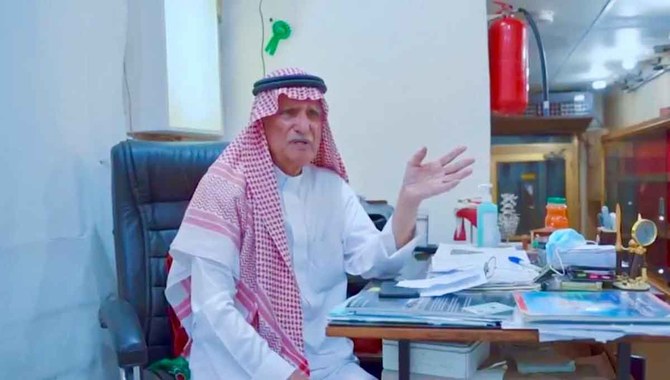ISLAMABAD: Pakistani doctor Nazir Ahmad Khan moved to Saudi Arabia six decades ago and opened his private clinic in the 1970s, charging 30 riyals per consultation.
Over fifty years later, the nonagenarian doctor’s fee remains the same, as does his love for his adopted home country of Saudi Arabia, which he says has shown him immeasurable kindness and respect and conferred upon him a second nationality.
#LISTEN: Dr. Nazir A. Khan narrates the memorable moment #Riyadh granted him #Saudi nationality for his medical services risking his life treating infected children in remote villages of #SaudiArabia || #Pakistan #Doctor
-
Read special by @iSaimaShabbir: https://t.co/1cjjmUVmIo pic.twitter.com/JMcqMHpRKA— Arab News Pakistan (@arabnewspk) September 30, 2020
“Saudi people and high government officials were very kind to me and appreciated my services,” Khan told Arab News in an interview via phone from the Saudi capital of Riyadh this week.

Pakistani doctor Nazir Ahmad Khan examines a patient at his clinic in Riyadh, Saudi Arabia, on September 29, 2020. (Photo Courtesy: Nazir Ahmad Khan)
“Saudi people and high government officials were very kind to me and appreciated my services,” Khan told Arab News in an interview via phone from the Saudi capital of Riyadh this week.
The doctor, who hails from Pakistan’s southern Sindh province, studied medicine in Lahore but moved to Riyadh in 1962, when the city only had three polyclinics.

In this group photo taken in 1962, Pakistani doctor Nazir Ahmad Khan (fifth from left) can be seen with his colleagues from his first place of work at the Darbar Hazrat Data Gunj Baksh Dispensary in Lahore, Pakistan (Photo Courtesy: Nazir Ahmad Khan)
“First they put me in one hospital temporarily and then I became the in-charge of Al-Futa hospital,” Khan said, referring to one of the polyclinics.
After the government allowed doctors to own private practices, Khan said he opened his own clinic in the early 1970s and would charge a 30-riyal consultation fee, which remains the same to date.

A group photo of Pakistani doctor Nazir Ahmad Khan with his classmates at the Royal Postgraduate Medical School, London, on May 28, 1983. (Photo Courtesy: Nazir Ahmad Khan)
“There were a lot of Pakistani laborers who were working in Riyadh; they were poor and unable to pay consultation fees,” the doctor said. “Therefore, I have never taken any fee from them and treated them free of cost.”
In 1968, Khan took oath as a Saudi citizen, in recognition of his services treating children in 60 remote Saudi villages for a deadly bacterial infection.
“There were 19 doctors in Riyadh and all of them, except myself, refused to go [to the remote villages] due to the fear of getting the infection,” the doctor said.
Khan said he was still connected to his native Pakistan where he visited relatives every two to three years. But his home and heart were in Riyadh, he added, a town whose transformation into a modern city he had personally witnessed.
“I keep on praying for the long life of both King Salman and Crown Prince Muhammad bin Salman (MBS),” the doctor said, “as both of them are working hard for peace, justice and progress of the Kingdom.”















